February is LGBT History Month, so what better time to take a few minutes to consider how UNISON has been making history in the fight for LGBT+ equality – and to have a chat with someone who’s been deeply involved in that struggle.
But first, let’s check out the history.
Decriminalisation of homosexuality in England and Wales finally occurred in 1967 – lesbianism had never been illegal. In 1976 NALGO, one of UNISON’s founding unions, was urging negotiators to seek to add sexual orientation to non-discrimination clauses in all collective agreements.
In 1981, NUPE member Susan Shell was sacked from her job as a residential care assistant for being a lesbian. While she had the support of her union, the law offered no protection at the time.
Ms Shell’s situation – and the lack of protection – saw NUPE affiliate to the Labour Campaign for Lesbian and Gay Rights, the first trade union to do so.
Also in 1981, decriminalisation finally arrived in Scotland and, 12 months later, in Northern Ireland.
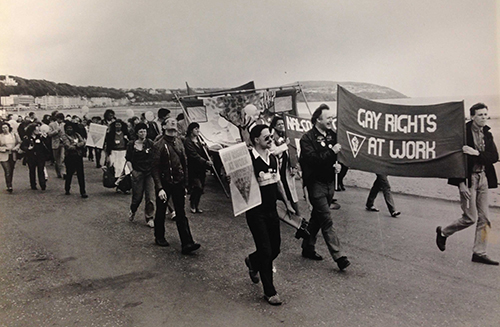
Marching on the Isle of Man
Fast forward to 1983 and NALGO’s annual conference in Douglas, on the Isle of Man. On the island, a British Crown dependency, homosexuality was still a criminal offence. At the conference, many delegates wore stickers saying ‘Glad to be gay in Douglas’ and ‘Gay OK’ and, on the Thursday, some 300 delegates marched along the promenade and through the main shopping centre to deliver a petition to the government building, calling for gay rights.
The Isle of Man finally caught up with the march of progress in 1991.

Remembering the contribution to the miners’ struggle (Carola Towle on the left)
In the meantime, in 1985, the Labour Party conference included a vote on whether to include lesbian and gay rights in its manifesto. Campaigners were on edge, but they knew that, as well as the support of the National Union of Mineworkers – in the wake of the events during the miners’ strike that are portrayed in the film Pride – their only other guaranteed support would come from NALGO and NUPE.
The vote passed and campaigning moved to the next stage.
COHSE joins the struggle
In 1987, COHSE joined the fight, passing a resolution at its conference to support equal opportunities for gay men and lesbians “at work and in the trade union and labour movement”.
UNISON’s constituent unions continued working around lesbian and gay equality throughout the 1980s – not least against Clause 28 of the Local Government Act, which is also known as Section 28.
It was finally repealed in Scotland in 2000, in England and Wales in 2003 and in the Isle of Man in 2006 (it never applied in Northern Ireland). No case had ever been brought under the legislation, but it caused a climate of censorship, confusion and fear, a loss of funding and support to organisations, and contributed to the struggles of lesbian and gay people.
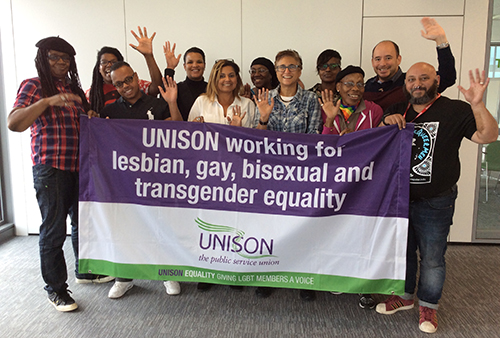
Inclusivity is our name
In 1990, The Voice newspaper published a series of articles, attacking and ridiculing Black lesbians and gay men.
Activists from NALGO formed Black Lesbians and Gay Men against Media Homophobia and, with the union’s help, launched a successful campaign to persuade public service employers not to advertise jobs in the paper.
The boycott was lifted when the paper’s directors met with campaigners and NALGO reps, and agreed to a full-page right of reply, improved representation for Black lesbians and gay men and a comprehensive equalities policy for its own staff.
Making more history
In 1991 NALGO elected Mike Blick as president – the first openly LGBT trade union leader in the UK.
In 2005, eight years after COHSE, NALGO and NUPE had founded UNISON, the union took the historic vote that created the LGBT group, including bisexual and transgender members in our self-organisation. In the same year, the union was recognised as bi-inclusive by BiCon, the UK’s national conference for bisexual people.
But nobody has been resting on their laurels.

Cover star Phillippa Scrafton
In 2013, Phillippa Scrafton was elected as the national LGBT committee’s first out trans chairperson (two years later, she was the cover star of U magazine, which went out to every one of the union’s then 1.3 million members) and Maureen Le Marinel became the union’s first out gay president.
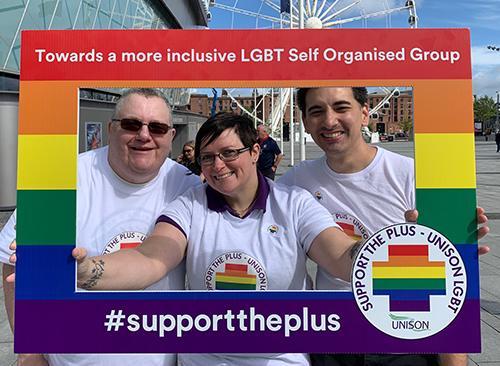
Adding the ‘plus’
And let’s not forget 2019, when activists won unanimous support at national delegate conference to change the group’s name to LGBT+, making us even more inclusive.
The work goes on – providing support for LGBT+ members across the union.
Meet UNISON’s LGBT+ history woman

Carola Towle
“1990. Thirty years ago,” muses Carola Towle of her work at NALGO and then UNISON, leading the union’s fight for LGBT+ equality.
“The 1980s had been a heady time to be a young lesbian in South East London. We were buzzing with ideas and activism. Lesbian venues were plentiful, if grungy.”
‘A lot to be angry about and a lot to do’
She explains that Greater London Council funding meant that many vacant high street shops were taken up by a host of women’s, race equality and community projects.
“We had fought the introduction of Thatcher’s Section 28 – the ban on the ‘promotion of homosexuality’ by local authorities. It reinforced the dangerous myth that lesbians and gay men were a threat to children. But despite our campaigning, Section 28 came into force in 1988, with a chilling effect on inclusive education, community funding and same-sex parenting. My first child was born early in 1989 and I feared for our family.”
In 1990, Carola responded to an advert in the Pink Paper to work for NALGO on lesbian and gay rights. At that time, workers could be sacked just for being gay and sexual orientation was not established as a legitimate workplace issue.
As we learned above, lesbians and gay men had been organising in NALGO since the mid 1970s. They had won recognition within the union and were pushing for recognition with employers, public service providers and in law.
“It has been my pride and privilege to work with them over the past three decades,” says Carola, who is now UNISON’s head of membership participation. “There have been many battles, losses which we still mourn, and real change.”

Carola – speaking up for public services
What is she most proud of?
“An impossible question, with so many bargaining, campaign and organising achievements,” she says. “So perhaps the answer is how we have worked.
“Too many lesbian and gay initiatives – then and, to some extent, still now – were based on the interests of the most privileged. Usually white, professional gay men. Never in our organising. We have always worked to be properly representative and to give those facing the greatest inequalities a voice.
“This is what gives our equality bargaining its authority. And while there is no doubt that far too many LGBT+ people still face discrimination at work, when accessing services and even when walking down the road, our rights are now established.”
Recognising UNISON’s diversity was also behind the move from a lesbian and gay group to an LGBT+ group, Carola explains. “Back in the day, there had been hostility to inclusion of bisexual members.
“Discrimination faced by transgender workers was not even discussed. The steps to our change are documented elsewhere. But there is no doubt that that change has made us stronger and more effective.”
So what next for this campaigning LGBT+ group and its allies?
“Many headline demands have been met,” notes Carola, “but as with other inequalities, LGBT+ discrimination is persistent and pervasive. We face new threats from a hostile government with a comfortable majority and the accompanying increase in hate.
“One example – trans rights are still too often framed as a matter of personal conscience. Despite legal protection going back to 1999, trans workers still face the highest levels of discrimination.
Be an ally
Everyone who is not themselves trans can be a “trans ally.” And UNISON has produced guidance to help you do that – and you can find it here.
“The old demands are replaced with new ones, concludes Carola. “But one thing I am certain of – UNISON is the place to be to work for equality.”

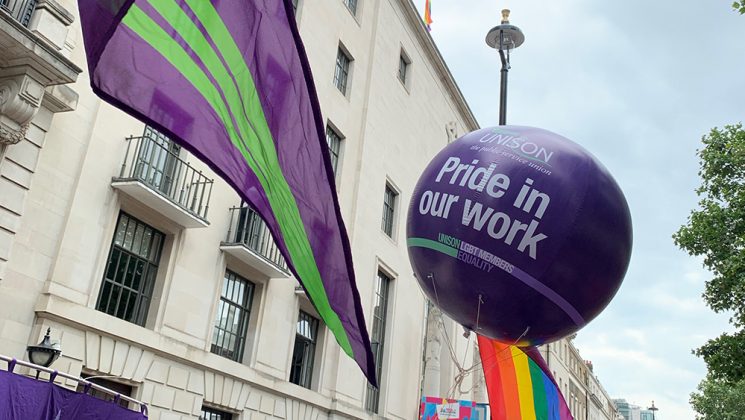
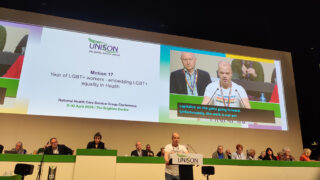
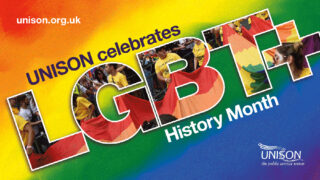
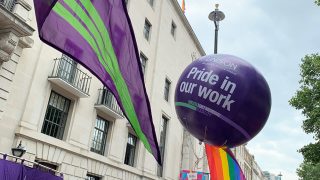
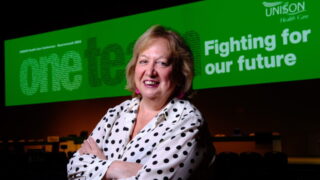
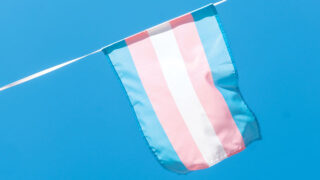
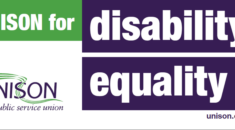
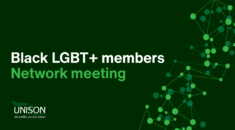
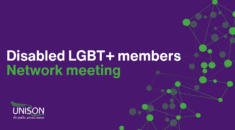
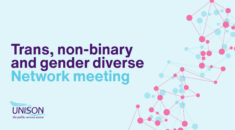
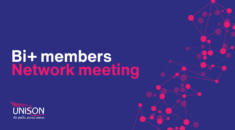
2 thoughts on “A union that keeps making LGBT+ history”